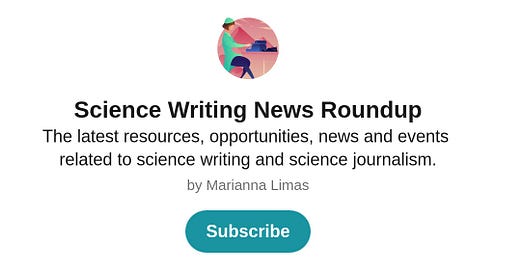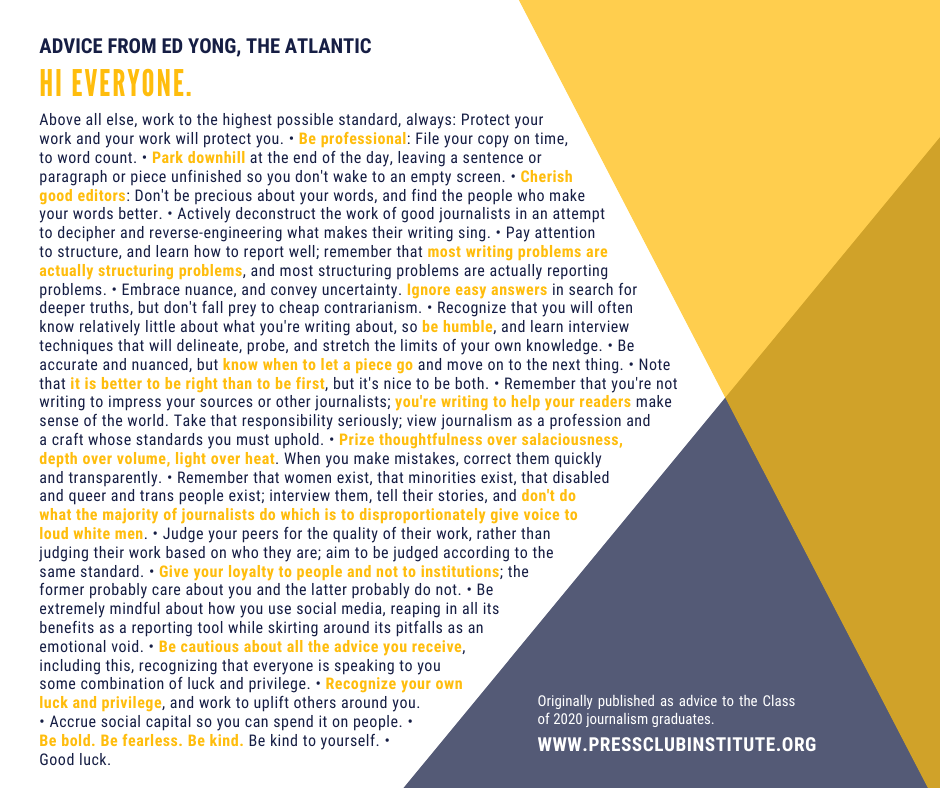✍️Science Writing News Roundup #4 (September 5, 2020)
Science writing tips from Ed Yong + Free email mini-courses covering the craft of science writing + Sharon Begley on keeping up with COVID-19 + Advice for covering the health beat, and more.
I'd love to hear from you, what do you think about this newsletter? Please click here to send your feedback!
Tips 💡
Science writing tips from Ed Yong: Earlier this year, the National Press Club Journalism Institute asked Ed Yong to give some advice to budding science journalists starting out in the field. Gavin Lamb, a sociocultural and applied linguist, complimented those pieces of advice with how he incorporates them into his own writing. “Remember that you’re not writing to impress your sources or other journalists; you’re writing to help your readers make sense of the world,” said Yong.
To help reporters new to covering health get off to the right start, The Open Notebook asked 18 health journalists: “What practical advice do you have for covering the health beat? What do you wish you’d known when you were starting out?”
Science Talk Editor Amy R. Nippert shares some phone interview tips for graduate students writing about science.
Opportunities 🤝
The Kavli Foundation has awarded The Open Notebook a $48,000 grant to create a series of free email mini-courses covering various aspects of the craft of science writing! Emily Laber-Warren, director of the Health and Science Reporting program at the Craig Newmark Graduate School of Journalism at CUNY, will be working with Siri Carpenter, Co-founder and Editor of The Open Notebook, to develop the courses.
Science Talk is now accepting proposals for speaking opportunities at the SCIENCE TALK '21 Annual Conference to be held online Wednesday, March 24 through Friday, March 26.
"Science Writer for Hire" is returning to NASW for another networking session. The organizers are asking Editors, PIOs and other people who are looking to hire writers to sign up no later than September 15. (Freelancers don’t need to sign up). Register for the conference here.
Videos 📺
Kenna Castleberry interviewed Sheril Kirshenbaum, co-author of Unscientific America: How Scientific Illiteracy Threatens Our Future, and Sam Kean, author of a book about the periodic table, The Disappearing Spoon.
Gene editing and journalism: News coverage and stories highlighted by journalists in a variety of forms are shaping society’s values and views on gene editing.
Conversations on Science: What Makes Science, Well, Science? with Ira Flatow, host of the popular “Science Friday” radio program, and Carlo Rovelli, a world-renowned physicist and bestselling writer.
Author spotlight 🔆
In her new book, Ainissa Ramirez describes the people behind technological advances and how they help and harm societies. “I didn’t want to preach to the choir and write a book for people who already liked science,” she says.
Sharon Begley, science writer at STAT News, gives Alan Alda a report from the front lines of medical research, while trying to keep up with research on the coronavirus.
Events 🕖
Political vs science correspondents covering Covid-19: conflict or cooperation? Are political and science journalists working together well in tough times? (September 8, 2020)
What are the issues with an Emergency Use Authorization for a COVID-19 vaccine? What should Operation Warp Speed do to ensure therapies and vaccines are affordable? Join SWINY (Science Writers in New York) co-chair David Levine and STAT writer Ed Silverman for a conversation about the business side of COVID-19 (September 10, 2020)
Preprints and Peer Review in a Pandemic. Join Carl Zimmer and other experts for a panel discussion hosted by Johns Hopkins Bloomberg School of Public Health about how COVID-19 is changing science and science news. (September 11, 2020)
The business of freelancing: Contracts, rates, platforms and more (September 13, 2020)
Science writing for a general audience, with Dr. Jen Martin, leader of the University of Melbourne's Science Communication Teaching Program (September 14, 2020)
Where does journalism go next? Join Columbia Journalism Review for a symposium on rethinking the news in the wake of COVID and the fight against racism (September 15-16, 2020)
Science Editor-in-chief H. Holden Thorp to discuss scientific publishing in the age of COVID-19 (September 16, 2020)
AAAS Kavli Science Journalism Awards 75th Anniversary. Maggie Koerth, Angela Saini, Carl Zimmer and Azeen Ghorayshi, four winners of the award, will discuss the present and future of science reporting (September 24, 2020)
News 📜
Receive an email notification when the Knight Science Journalism Program at MIT's Digital Handbook on Science Editing is available online!
New research from the Science Communication Unit at UWE Bristol shows that science communication is still more dissemination than dialogue, and social media isn't helping! What can we do about it?
Maria Pazi named European Science Journalist of the Year at ECSJ2020. The runners-up are Micho Tatalovic and Stan van Pelt. ABSW and EFSJ are currently looking for partners/sponsors for future editions of the award.
European Federation for Science Journalism announces Climate Grant winners. The grant supports investigative journalism projects about climate change science that have not yet been published.
Capital Science Communicators (which is connecting science communicators across California’s Capital Region) announces the 2020-2021 executive board.
The Online News Association (ONA) announces the 2020 Online Journalism Awards finalists. This year, they are including awards for excellence in newsletters, and excellence in online journalism that covers climate change.
Scientific American celebrates its 175th birthday. Editor-in-chief Laura Helmuth says the magazine has the following editorial priorities: to improve diversity and inclusion, and to cover public health more generally, and the science of misinformation.
Book review 📖
“Reading Adam Rutherford’s How to Argue with a Racist has empowered me with ammunition to respond to racial discrimination should I encounter someone trying to justify their prejudice with science,” writes Jennifer Newton.
I'd love to hear from you, what do you think about this newsletter? Please click here to send your feedback!
👉 Don’t miss any updates from the Science Writing News Roundup!
If you liked this post, share it with your friends! 💙
Image by Janet Gooch from Pixabay




